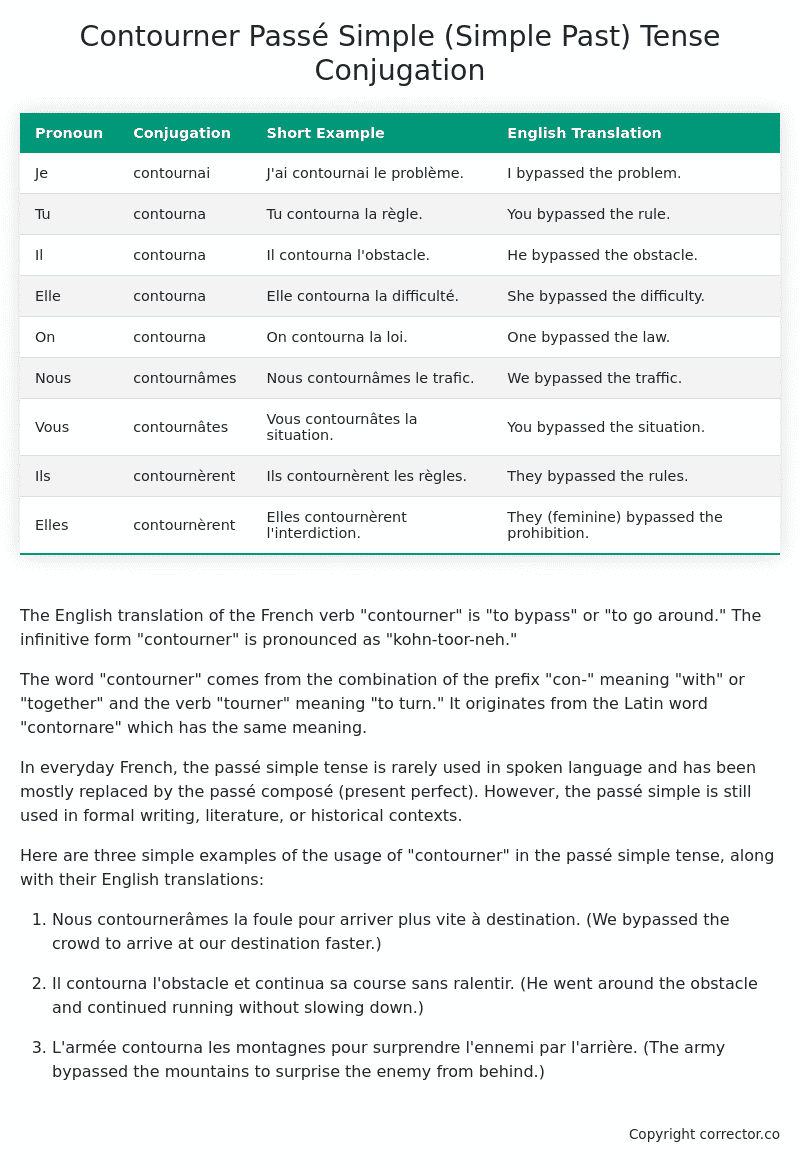Passé Simple (Simple Past) Tense Conjugation of the French Verb contourner
Introduction to the verb contourner
The English translation of the French verb “contourner” is “to bypass” or “to go around.” The infinitive form “contourner” is pronounced as “kohn-toor-neh.”
The word “contourner” comes from the combination of the prefix “con-” meaning “with” or “together” and the verb “tourner” meaning “to turn.” It originates from the Latin word “contornare” which has the same meaning.
In everyday French, the passé simple tense is rarely used in spoken language and has been mostly replaced by the passé composé (present perfect). However, the passé simple is still used in formal writing, literature, or historical contexts.
Here are three simple examples of the usage of “contourner” in the passé simple tense, along with their English translations:
-
Nous contournerâmes la foule pour arriver plus vite à destination.
(We bypassed the crowd to arrive at our destination faster.) -
Il contourna l’obstacle et continua sa course sans ralentir.
(He went around the obstacle and continued running without slowing down.) -
L’armée contourna les montagnes pour surprendre l’ennemi par l’arrière.
(The army bypassed the mountains to surprise the enemy from behind.)
Table of the Passé Simple (Simple Past) Tense Conjugation of contourner
| Pronoun | Conjugation | Short Example | English Translation |
|---|---|---|---|
| Je | contournai | J’ai contournai le problème. | I bypassed the problem. |
| Tu | contourna | Tu contourna la règle. | You bypassed the rule. |
| Il | contourna | Il contourna l’obstacle. | He bypassed the obstacle. |
| Elle | contourna | Elle contourna la difficulté. | She bypassed the difficulty. |
| On | contourna | On contourna la loi. | One bypassed the law. |
| Nous | contournâmes | Nous contournâmes le trafic. | We bypassed the traffic. |
| Vous | contournâtes | Vous contournâtes la situation. | You bypassed the situation. |
| Ils | contournèrent | Ils contournèrent les règles. | They bypassed the rules. |
| Elles | contournèrent | Elles contournèrent l’interdiction. | They (feminine) bypassed the prohibition. |
Other Conjugations for Contourner.
Le Present (Present Tense) Conjugation of the French Verb contourner
Imparfait (Imperfect) Tense Conjugation of the French Verb contourner
Passé Simple (Simple Past) Tense Conjugation of the French Verb contourner (You’re reading it right now!)
Passé Composé (Present Perfect) Tense Conjugation of the French Verb contourner
Futur Simple (Simple Future) Tense Conjugation of the French Verb contourner
Futur Proche (Near Future) Tense Conjugation of the French Verb contourner
Plus-que-parfait (Pluperfect) Tense Conjugation of the French Verb contourner
Passé Antérieur (Past Anterior) Tense Conjugation of the French Verb contourner
Futur Antérieur (Future Anterior) Tense Conjugation of the French Verb contourner
Subjonctif Présent (Subjunctive Present) Tense Conjugation of the French Verb contourner
Subjonctif Passé (Subjunctive Past) Tense Conjugation of the French Verb contourner
Subjonctif Imparfait (Subjunctive Imperfect) Tense Conjugation of the French Verb contourner
Subjonctif Plus-que-parfait (Subjunctive Pluperfect) Tense Conjugation of the French Verb contourner
Conditionnel Présent (Conditional Present) Tense Conjugation of the French Verb contourner
Conditionnel Passé (Conditional Past) Tense Conjugation of the French Verb contourner
Conditionnel Passé II (Conditional Past II) Tense Conjugation of the French Verb contourner
L’impératif Présent (Imperative Present) Tense Conjugation of the French Verb contourner
L’impératif Passé (Imperative Past) Tense Conjugation of the French Verb contourner
L’infinitif Présent (Infinitive Present) Tense Conjugation of the French Verb contourner
L’infinitif Passé (Infinitive Past) Tense Conjugation of the French Verb contourner
Le Participe Présent (Present Participle) Tense Conjugation of the French Verb contourner
Le Participe Passé (Past Participle) Tense Conjugation of the French Verb contourner
Struggling with French verbs or the language in general? Why not use our free French Grammar Checker – no registration required!
Get a FREE Download Study Sheet of this Conjugation 🔥
Simply right click the image below, click “save image” and get your free reference for the contourner Passé Simple tense conjugation!

Contourner – About the French Passé Simple (Simple Past) Tense
Formation
Usage
Narration
Historical Context
Interactions with other tenses
Passé Composé
Imparfait
Conditional and Subjunctive
Summary
I hope you enjoyed this article on the verb contourner. Still in a learning mood? Check out another TOTALLY random French verb conjugation!


